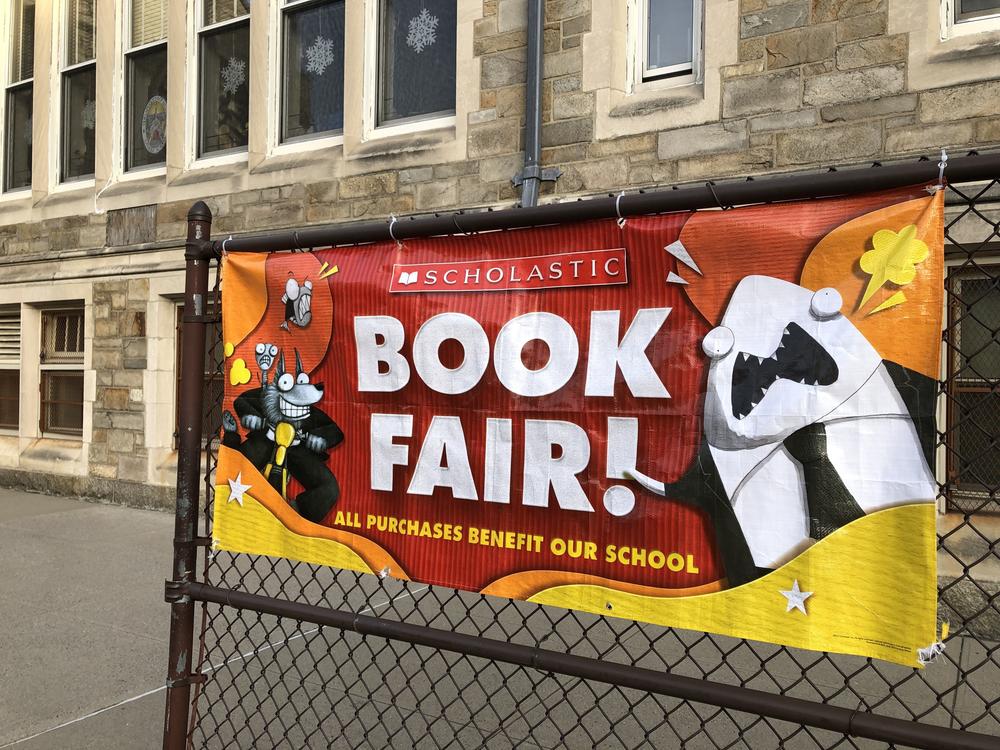Section Branding
Header Content
U.S. book bans are taking a toll on a beloved tradition: Scholastic Book Fairs
Primary Content
It's fall, which means it's Scholastic Book Fair season. Schools across the country are setting up shelves in their libraries and gymnasiums to let students shop a vast selection of books provided by the educational and publishing company. It's a highlight for many students, and a nostalgic memory for many adults.
But the events have also waded into controversy, after the company behind them changed its policy to help schools navigate the growing number of book bans in the U.S. — and was quickly accused of caving to censorship.
The accusations started swirling on TikTok and Reddit last month: Scholastic — the billion-dollar educational company that both publishes and distributes books — was allowing schools to opt out of providing diverse books at its nationwide book fairs, according to complaints by several school librarians.
They said Scholastic was putting most of the books focused on race and sexuality into a separate display and letting schools decide whether to order it.
Backlash was swift. Scores of writers and educators on social media accused the company of helping to enable book restrictions, and argued that the company was not taking a strong enough stand against them.
Scholastic acknowledged the change in a statement on Friday, but defended its decision. Enacted or pending legislation in more than 30 states prohibits certain kinds of books — mostly "LGBTQIA+ titles and books that engage with the presence of racism in our country" — from being in schools, the company said.
Because book fairs take place in schools and without parental supervision, it said, such laws create "an almost impossible dilemma: back away from these titles or risk making teachers, librarians, and volunteers vulnerable to being fired, sued, or prosecuted."
Scholastic says it's trying to help schools navigate a complicated landscape
The company said in order to continue offering diverse books, it created a new collection for its elementary school fairs called "Share Every Story, Celebrate Every Voice."
"We don't pretend this solution is perfect — but the other option would be to not offer these books at all — which is not something we'd consider," Scholastic said, adding that there are still diverse titles at all of its book fairs and that middle school fairs remain unchanged.
A Scholastic spokesperson told NPR that the company has been in touch with customers about the new policy since August.
They said many school districts had questions and concerns about how to navigate the new legislation, which in some cases took effect over the summer. Those conversations, they added, weren't about how to eliminate certain books from their fairs, but how to safely hold a fair in the current climate.
According to a list shared with NPR, out of the more than 100 titles in this year's book fair, most of the books dealing with issues of race, gender and sexuality are in the "Share Every Story, Celebrate Every Voice" collection.
The case includes some 30 books, ranging from The ABCs of Black History to biographies of Rep. John Lewis, Ruby Bridges and Supreme Court Justice Ketanji Brown Jackson. There are picture books and graphic novels by poet Amanda Gorman, civil rights activist and football player Colin Kaepernick, and Jojo Siwa, a dancer and internet personality who came out as gay in 2021. A book based on the PBS animated show Alma's Way features a Puerto Rican family hunting for a kid's missing tooth.
The Scholastic spokesperson says moving those titles to a specific group made space to include more diverse books in their other collections and that the change has been largely well-received by school districts.
Book bans pose all sorts of risks
The movement to restrict books is "driven by a vocal minority demanding censorship," says the free speech group PEN America, which said it found 3,362 cases of book bans in the 2022-'23 school year, up from 2,532 bans in the 2021-'22 school year. The group defines a ban as any move that restricts access to a book. A majority of Americans oppose book restrictions, according to an NPR/Ipsos poll.
It says such bans in schools and libraries are most prevalent in Texas, Florida, Missouri, Utah and South Carolina, but are being "modeled and replicated across the country."
Many districts are still figuring out what new book bans mean for their classrooms and libraries.
The wording of the laws themselves — and the resulting legal back and forth — have created a lot of confusion, as is the case in Texas where one of those new laws temporarily takes effect this month after an appeals court blocked a judge's injunction against it.
A fifth-grade teacher in Georgia was fired earlier this year for reading out loud from a book addressing gender stereotypes, which she said was chosen from the Scholastic book fair. (She appealed her termination to the State Board of Education last month.) A middle school teacher in Texas was fired for assigning her class an illustrated adaptation of Anne Frank's diary.
Other librarians and educators across the country have faced harassment, threats and termination in the face of book bans, anti-critical race theory protests and other culture war issues. Some have started to censor themselves, while others have resigned altogether.
Mychal Threets, a librarian in California with a large social media following, responded to the Scholastic change on TikTok.
Addressing the company, he said: "We are fighting for the freedom to read. We are celebrating the freedom to read. Join us. You are the powerhouse. Use your voice."
Copyright 2023 NPR. To see more, visit https://www.npr.org.

